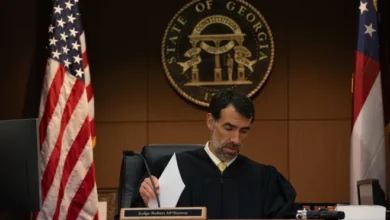‘Very worrying’: Three far-right parties enter Greek parliament

When leaders of the neo-Nazi group Golden Dawn were jailed in 2020, it was seen as an end to the party – once the third largest force in the Greek parliament – and the far-right ideology it had tried to mainstream.
All of that was called into question this week with the election of three far-right parties, including Spartans, backed by former Golden Dawn frontman Ilias Kasidiaris.He regularly broadcasts from jail and attracts tens of thousands of views on his YouTube channel.
Golden Dawn was known for its Nazi salutes and violent street attacks, particularly on refugees and migrants. It was also linked to the murder of rapper Pavlos Fyssas in 2013.
Although the three far-right parties account for a small minority of the political make-up of the parliament, concerns remain about what their views on issues such as abortion, migration and LGBTQ+ rights could mean for Greek politics.
“After the Golden Dawn trial, I think people got a bit complacent about what was going on in that kind of space and thought that that might put a lid on it – but obviously, that hasn’t happened,” said Georgia Nakou, a political and financial analyst focusing on Greece who contributes to the Greek analytical site Macropolis.
“I think it’s a combination of mainstream parties, and particularly New Democracy, legitimising a lot of the right-wing agenda, particularly the anti-immigration stuff,” she said.
“Because New Democracy has been worried about losing votes to these parties on the right, they have been adopting some of their policies and their rhetoric, for example, on family values or migration or ‘culture wars’ issues.”
Nakou pointed out that this has not led to any greater election success for the conservative governing party, which won 158 seats in Sunday’s elections, but failed to significantly increase its parliamentary majority from the 2019 elections, in which it toppled the left-wing party Syriza party from power.
“Any kind of advantage, that they may have thought they’d gained has been ceded to this fringe space,” she said, adding that it would now be important to monitor how rights such as abortion became suddenly up for debate.
A gap needs to be filled
Georgios Samaras, assistant professor of public policy at Kings College London, told Al Jazeera that it remained to be seen how the influence of these far-right parties would play out moving forward but there was no question that those who voted for Spartans were “well aware” they were backing a party supported by a former Golden Dawn official.
“Without his endorsement, the party would not have gotten 4.6 percent of the vote,” he said.
“So the people who voted for Spartans know Kasidiaris’s past. They are aware of the fact that he’s jailed for running a criminal organisation. I’m pretty sure that ideologically there’s no question that they align with this now,” Samaras added.
“Golden Dawn has left a legacy, a gap that needs to be filled by someone, and Spartans is the continuation of Golden Dawn.”
One of the reasons some of these far-right factions were able to enter parliament, Samaras said, is the “highly nationalist” agenda pursued by New Democracy in its past four years in power.
New Democracy has faced numerous allegations of violating the rule of law, including the illegal pushbacks of refugees at sea and an ongoing wiretapping scandal.
The scandal saw Prime Minister Kyriakos Mitsotakis accused of overseeing spying on journalists and opposition leaders as well as his closest ministers and the heads of the armed forces.
“Whoever perceives New Democracy to be a centre-right party, I think is quite wrong,” Samaras said. “I do believe that New Democracy is, right now, a right-wing party with strong far-right factions within the government.”
“If those factions dominate the party’s agenda in the next four years, I can see New Democracy moving further to the right in order to attack the domination of this far-right block that has emerged between those three parties.”










